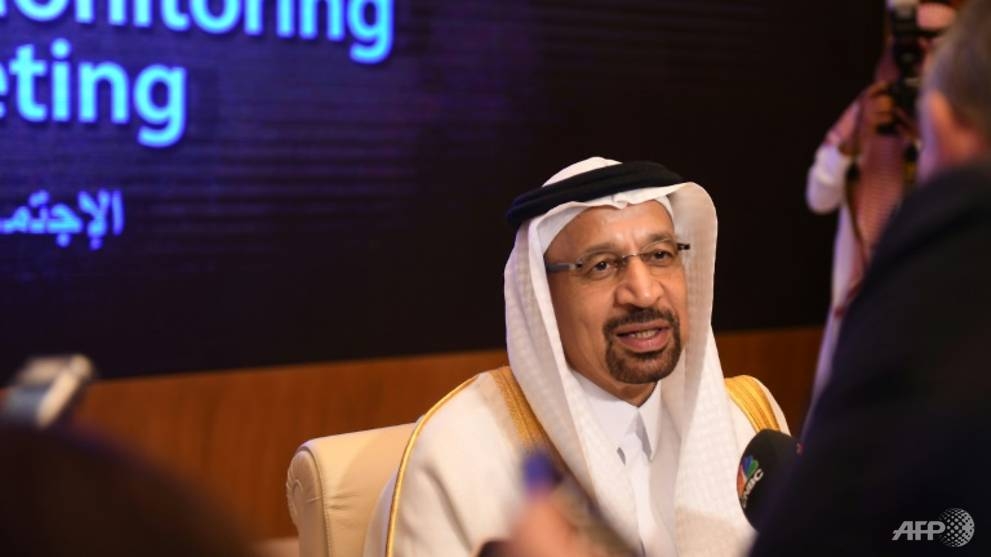Russia, Saudis signal oil production boost
 |
| Saudi oil minister Khaled al-Faleh said at an economic conference in Russia that a gradual output increase could happen in the second half of the year to prevent any supply shocks. (Photo: AFP/Amer Hilabi) |
The suspected double-agents were charged and detained last December, but the incident only came to light late Thursday following French media reports and a statement from Defence Minister Florence Parly.
"Two French agents in our service and probably one of the spouses of these agents are accused of serious acts likely to be considered acts of treason, on suspicions of delivering information to a foreign power," Parly told CNews television.
Speaking from Moscow, French President Emmanuel Macron called the alleged conspiracy "extremely serious" and said the justice system would investigate and judge the suspects.
A security source, speaking to AFP on condition of anonymity, confirmed French media reports that the two agents at the General Directorate of External Security (DGSE) were suspected of working for China.
At least one of them had been posted in the country, according to the "Quotidien" programme on French broadcaster TMC, adding that the men had been uncovered by domestic counter-intelligence agents.
Beijing has long been accused of commercial spying to capture valuable intellectual property, but its intelligence operations are thought to have expanded in step with its growing foreign ambitions.
"They're trying to learn what other powers intend to do in terms of politics, diplomacy, etcetera, while of course continuing their hunt for economic information," said Alain Chouet, a former head of intelligence and security at the DGSE.
'FISH IN DEEP WATER'
According to French researcher Philippe Marvalin, writing in the "Dictionary of Intelligence" published in March, China has 18 spy agencies employing some 7,000 people handling 50,000 agents known as "chen diyu", or "fish swimming in deep water".
"The US is their main target, and in Europe they are especially active in France, Britain, the Netherlands and Germany," he wrote.
Another former spy chief, who insisted on anonymity, told AFP that Beijing has sent agents to all corners of French industry, including attractive students to French universities who can be used to entrap targets.
"You meet someone here or there: It's quiet infiltration, nothing dramatic. It's not like the movies," he said.
Francois-Yves Damon, a China specialist and historian who consulted for the DGSE, recalls surprising a Chinese student at the elite ENA school, which produces France's top public servants, photocopying huge piles of documentation.
"Anything he could get his hands on!" Damon told AFP.
"Knowing the capacity of China's secret services, seeing two former DGSE agents caught and imprisoned doesn't surprise me a bit," he said.
'EXTREMELY VIGILANT'
The revelations came just a few weeks after US authorities indicted a former CIA operative on charges of spying for China, following his arrest in January.
And concerns about Chinese spying in Australia led to reforms to espionage and foreign interference legislation last year which singled out Beijing as a focus of attention.
Asked Friday about the arrests in France, China's foreign ministry said it was unaware of the situation.
The agents are now retired but Parly said they were "quite likely" still in service at the time, though investigators were still determining how long they had been passing along intelligence.
She also declined to specify the nature of the compromised information, nor to reveal if the two agents were working together.
But a source close to the inquiry said prosecutors have requested the declassification of DGSE documents dating from Jul 6, 2016, to Apr 19, 2017, suggesting the agents may have been compromised for months.
In a statement, the DGSE - similar to Britain's MI6 or the United States's CIA - said the revelations "are a major area of focus for the DGSE as well all French counter-intelligence services."
What the stars mean:
★ Poor ★ ★ Promising ★★★ Good ★★★★ Very good ★★★★★ Exceptional
 Tag:
Tag:
Related Contents
Latest News
More News
- Russian President congratulates Vietnamese Party leader during phone talks (January 25, 2026 | 09:58)
- Worldwide congratulations underscore confidence in Vietnam’s 14th Party Congress (January 23, 2026 | 09:02)
- Political parties, organisations, int’l friends send congratulations to 14th National Party Congress (January 22, 2026 | 09:33)
- 14th National Party Congress: Japanese media highlight Vietnam’s growth targets (January 21, 2026 | 09:46)
- 14th National Party Congress: Driving force for Vietnam to continue renewal, innovation, breakthroughs (January 21, 2026 | 09:42)
- Vietnam remains spiritual support for progressive forces: Colombian party leader (January 21, 2026 | 08:00)
- Int'l media provides large coverage of 14th National Party Congress's first working day (January 20, 2026 | 09:09)
- Vietnamese firms win top honours at ASEAN Digital Awards (January 16, 2026 | 16:45)
- ASEAN Digital Ministers' Meeting opens in Hanoi (January 15, 2026 | 15:33)
- ASEAN economies move up the global chip value chain (December 09, 2025 | 13:32)






















 Mobile Version
Mobile Version